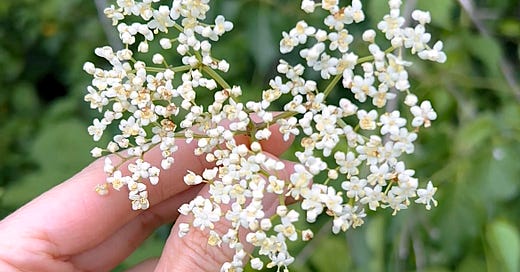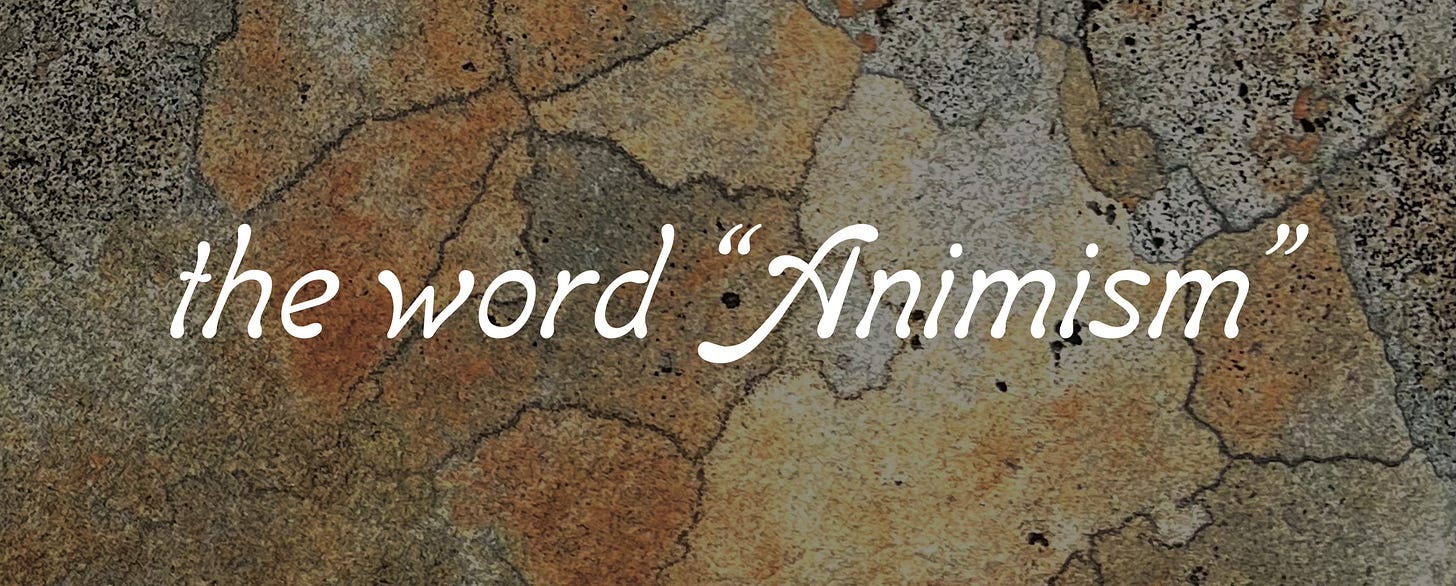The Word “Animism”
And how it tried to invalidate our connection to the natural world
A lot of people have their own practices rooted in a connection with the living world, but our language doesn’t offer much to describe them. The closest I know is the word “animism”, derived from the latin word for life or soul, and often used to mark the aliveness in everything around us. But this word has an unsavory past - it was a word coined by white people as a way to invalidate the worldview of people who they decided were below them. Cultures that lived in a reciprocal relationship with the natural world did not call themselves animists. There wasn’t even a word needed for their beliefs because it was such a natural part of life, it didn’t require an isolated definition. Their worldview did not exist in a line-up with all other perspectives, and it did not need to be judged in tandem with what others decided was valid.
"Attribution of living souls to inanimate objects," was how Edward Tylor defined the concept of animism when it was first named in the 1800s. He somehow managed to take a beautiful, poetic, meaningful way of interacting with the world and reduce it down to a condescending and sterile explanation. If the definition itself isn’t bad enough, let me add that it was published in his piece called Primitive Culture in 1871.
I haven’t been able to get all the way through Primitive Culture, admittedly. It isn’t just because of how racist, classist, and insufferable it is, but it’s also because he incorrectly presents the idea of animism itself. It reminds me of when white people attempt to belittle a foreign language through mimicry, when they reduce another culture’s words down to unintelligible sounds that vaguely resemble what they think they heard in an attempt to put down that culture while still getting a laugh from their buddies. The book isn’t a scientific read about what other cultures believe; it’s a tome of bullying that began a smear campaign against whoever he decided was “primitive”. The word “animism” originates as a racist tool.
It’s no wonder that most people who have a relationship with the animate world don’t call themselves animists. But there’s not another universal word that could come close to describing certain beliefs when we need to discuss them with other people. This tension often keeps the animistic worldview out of our mouths, and because of the colonization of so many cultures, it attempts to put it out of reach completely. This tension has created a crack, and this is where I lean into.
Actual animistic beliefs are about tending to the connections of the non-human world and allowing those connections to teach us what it means to be human. It is a recognition that there is so much more beyond the idea of an individual, and that human beings are a part of the whole. For some, it can be about blurring the lines between the physical and metaphysical by working with spirits or other energetic presences, but I actually do not see this belief as essential to animism (as controversial as that may be). Animism requires respect of other beings and their own experiences, and the ability to be open to other ways of understanding beyond our own language. And where the limits of animistic understanding stop is up to the depth of the connection. Some even find a certain aliveness or presence in words, art, and ideas themselves.
There is room for people to hold animistic beliefs on a range of levels. I see a lot of people have meaningful relationships with their pets or houseplants, which I would consider a facet of these beliefs. So could taking hikes in the woods to clear the mind, or tending to a garden, or even showing respect and appreciation for food. Anything that pulls us out of the idea that we are a disconnected individual and reminds us of how interconnected we are with the natural world could probably qualify as animism.
My personal worldview ventures on the deep side of this spectrum. I have never not known an electric relationship with an animate world, and I strive to listen to all beings as much as I would listen to people. I was about 3 years old when I told my mother that the dandelions in the yard were letting me know that they did not want to be mowed and we should find a different way. She told me the city we lived in said the lawn needed to be mowed, so she was going to still do it. I went around and picked every dandelion I could find so I could give them love and respect, rather than have them ripped to shreds with a machine for an arbitrary rule. For some reason, we even have a picture of the moment I realized I would be stewarding these beliefs in a culture that did not encourage them.
The listening to the natural world never stopped. I resisted it for a while, but I became depressed and isolated when I was denying my connection to non-human beings. It was a homecoming when I allowed myself to be fully immersed in it again - this is when I decided to tend to it as a priority in my life and see how deep these relationships could go. This was also the point I began to refer to myself as an animist, when pressed for a label.
The more time I spent with certain beings - with the chipmunks living under my porch, with the century-old rhododendrons that my neighbor’s family had cultivated, with the robins that woke me up each morning with their song, with the mysterious mushrooms dotting the understory of the conifers who brushed up against my house - I started noticing how much I was learning from them. As I accepted them as my teachers, I also made sure I was also giving back. I taught my children about the chipmunks, pruned the rhododendrons, fed the birds, learned the names and unique needs of the mushrooms. I slowed my pace down and worked on making intentional decisions that would not only benefit me, but benefit the beings directly around me that were enriching my life.
It was easy to love the cute animals and sweet smelling flowers, but it was when the difficult beings showed up that my real lessons began. The uninvited bacteria that entered my lungs and left my airways scarred, the defensive hornets who made a nest at my window, the argumentative neighbors, the poison plants appearing in the yard that felt ominous and threatening. They are a part of the natural world, too. While I would have loved to turn away from the stress they brought, I knew it would prevent me from accepting nature as a whole - and ultimately limiting the acceptance of myself in the same way. It was sitting with the difficult beings that tied my life together with the animate world in an inseparable knot. I became devoted to working with the poisons, the invasives, the unwanted beings that humans prefer to control or reject rather than listen to. They offer endless lessons and philosophical questions about the sides of human nature that our culture would like to sweep under the rug. My desire to share their value as teachers for our modern times is what finally made me begin writing again.
And what a way to honor them but to argue against a 150 year old anthropological definition that tried to invalidate our innate connection to the world around us.








The origins of how we define ourselves is so fascinating. Language can be an incredible translator for the symbiotic vibratory intimacy that we are experiencing, a great way to integrate the energy that we are learning with, as a layer of expressive understanding... Yet the words of our current human experience (in English for me) seem to fall short of the Wholeness ecology that we are enmeshed within. And to further muddle the magic, words have become weapons in so many ways. The beautiful balance to this, is the invitation to consciously play with our words to formulate poetry with our lived experience. Poetry without rules, or specific structure... just heartfelt translations of our very human reflections of this reality. I understand why folks lean INTO the word Animism, but knowing the origins certainly changes my perspective of the word. Like God, I do not think Nature's expression needs a word for us to cage it within. Thanks for this reminder 💞
Thank you for this 🧡